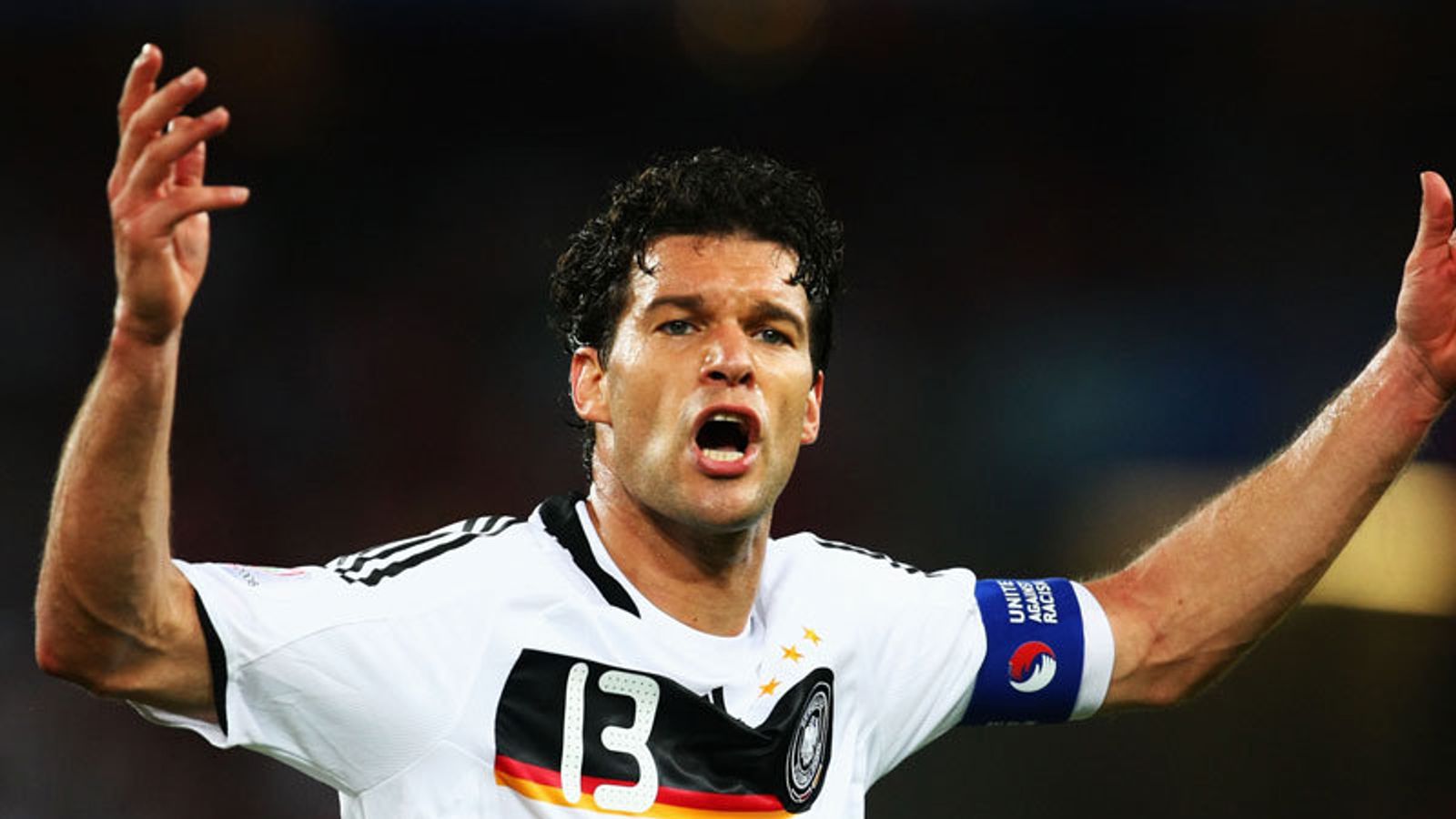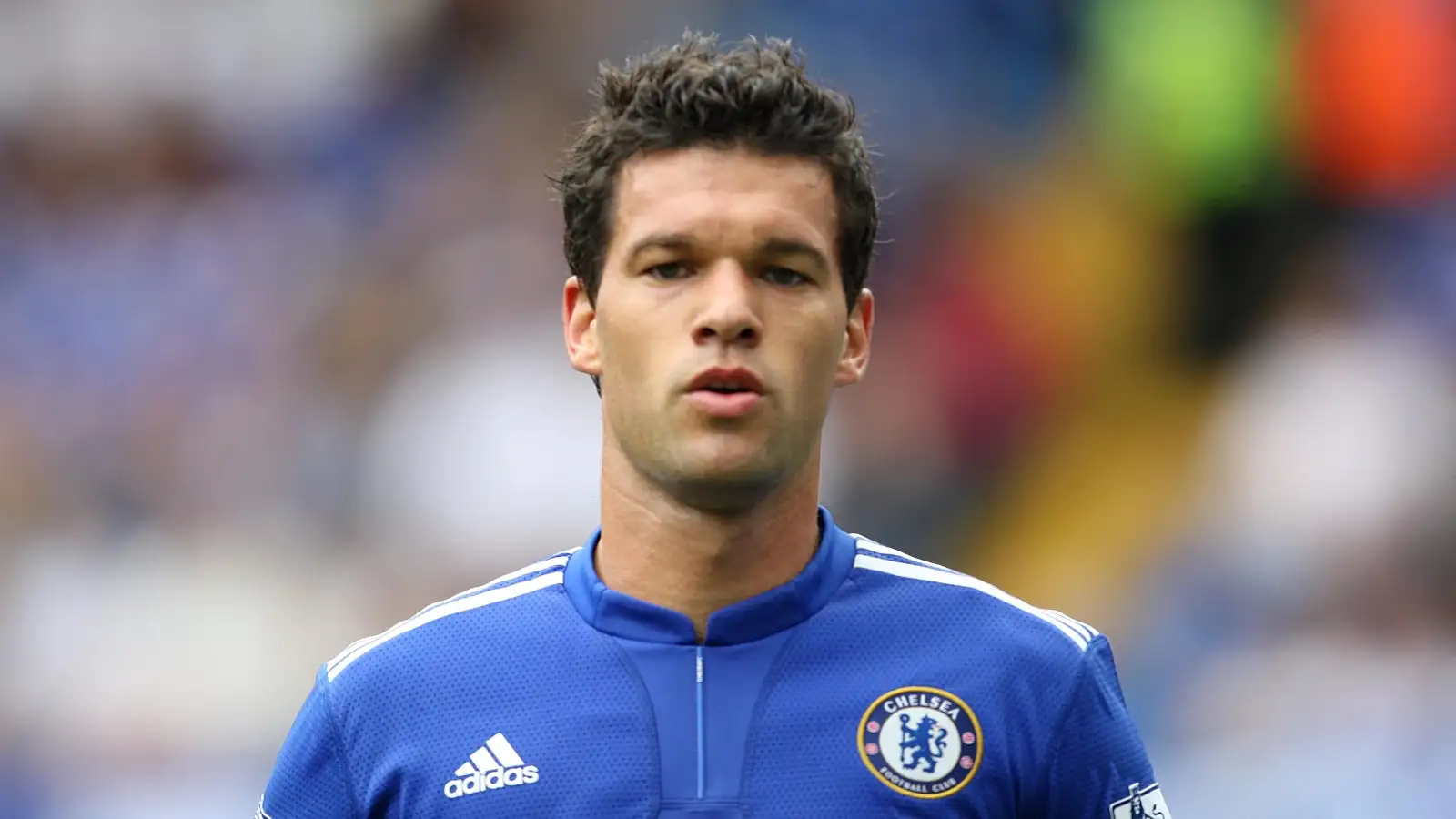Michael Ballack ( Part 2)
Michael Ballack ( Part 2)

After the 2002 FIFA World Cup, where Michael Ballack's performances garnered interest from top clubs like Real Madrid, he ultimately decided to join Bayern Munich in a €6 million deal. His arrival coincided with a successful period for the club. In his first season with Bayern, they clinched the Bundesliga title with 75 points and also won the DFB-Pokal, with Ballack contributing two goals, including one in the final against his former club 1. FC Kaiserslautern.
However, the following season saw Bayern lose both their Bundesliga and DFB-Pokal crowns to Werder Bremen. Nonetheless, Ballack continued to play a crucial role for the team under the management of new coach Felix Magath. In the 2004–05 season, Bayern enjoyed success once again, securing another league and cup double, with Magath regarding Ballack as the only automatic starter in midfield.
During his four seasons at Bayern Munich, Ballack achieved considerable success, winning three Bundesliga and DFB-Pokal doubles and scoring a total of 44 goals in 107 Bundesliga matches. His overall tally in the domestic league between 1998 and 2005 stood at an impressive 61 goals.
However, despite his domestic accomplishments, Ballack faced criticism for his performances in important Champions League matches, with some labeling him as someone who "choked" on such occasions. This criticism was not only confined to fans but also came from prominent figures within the club, including general manager Uli Hoeneß, communications director Karl-Heinz Rummenigge, and club president Franz Beckenbauer, all of whom were former Bayern players. Beckenbauer went as far as accusing Ballack of "saving his strength" for potential future employers after what he deemed as an average performance by Ballack in the 2006 DFB-Pokal final against Eintracht Frankfurt.
After an illustrious stint with Bayern Munich, Michael Ballack made a significant move to the English Premier League, joining Chelsea on a free transfer on 15 May 2006. Despite reported interest from other top clubs such as Manchester United, Real Madrid, Internazionale, and Milan during his final season at Bayern, Ballack opted for Stamford Bridge.
Upon his arrival at Chelsea, Ballack expressed his desire to potentially finish his career at the club, indicating his commitment to the English side. This move marked a new chapter in Ballack's career, as he sought to make an impact in one of the most competitive leagues in the world with Chelsea.
Michael Ballack's Chelsea debut took place on 31 July 2006, during a practice match held at UCLA's intramural football pitch. The following day, Chelsea officially introduced him to the media, presenting him with his preferred number 13 shirt, which he had worn throughout his career. This move, however, led to tension with William Gallas, who previously held the number 13 shirt and was subsequently given the number 3 shirt.
Ballack's competitive debut for Chelsea occurred in the 2006 FA Community Shield, although he had to be substituted off due to injury in the first half. He made his Premier League debut against Blackburn Rovers on 27 August 2006 and scored his first goal for the club in the Champions League against Werder Bremen on 12 September of the same year.
However, Ballack's time at Chelsea was not without controversy. He received his first straight red card during Chelsea's 1–0 win over Liverpool on 17 September 2006, for an alleged stamp on Mohamed Sissoko's leg. Despite facing criticism for some of his performances, Ballack managed to score several important goals for Chelsea, including in the FA Cup semi-final against Blackburn in April 2007, which helped Chelsea advance to the final.
Unfortunately, Ballack missed the FA Cup final against Manchester United due to ankle surgery he underwent in Munich, which prevented him from participating in the match. Nonetheless, Chelsea won the final 1–0, adding to Ballack's trophy collection for the season, which also included the League Cup.
During the summer transfer window of 2007, there were persistent rumors surrounding Michael Ballack's potential departure from Chelsea. However, Ballack denied these rumors and remained at the club, with no move materializing. Despite his desire to stay, Ballack faced a setback when Chelsea left him out of their Champions League squad for the 2007–08 group stage due to concerns about his fitness following an ankle operation in the summer. Chelsea opted to select the fully fit Steve Sidwell instead.
Ballack made his return to the Chelsea side in December 2007, featuring in a League Cup win over Liverpool where he provided an assist to Andriy Shevchenko. He then returned to Premier League action in a thrilling match against Aston Villa, where he earned a penalty and scored a free-kick, contributing to a 4–4 draw.
In subsequent matches, Ballack showcased his leadership qualities by captaining the Chelsea team in the absence of John Terry and Frank Lampard. He scored crucial goals, including the winning goal against Fulham and Reading, as well as important strikes in the Champions League against Olympiacos and Fenerbahçe.
One of Ballack's standout performances came on 26 April 2008, when he scored a header and a penalty to secure a 2–1 victory over Manchester United, earning him the Man of the Match award. This victory kept Chelsea in contention for the Premier League title until the final matchdays of the season.
Despite his individual success, the season ended disappointingly for Ballack and Chelsea, as they finished runners-up in the League Cup, Premier League, and Champions League. Additionally, Ballack experienced another runner-up finish with the German national team in the final of UEFA Euro 2008, marking the second time in his career that he was a runner-up for four major trophies in a single season.
The 2008–09 season started promisingly for Michael Ballack, as he contributed to Chelsea's 4–0 win over Portsmouth by setting up Joe Cole for the opening goal. However, Ballack suffered an injury shortly after and missed several key matches against Manchester United, Liverpool, and Arsenal. His return from injury provided a boost for Chelsea, as he played a crucial role in setting up Deco for a goal in a 2–0 victory over Bolton Wanderers.
Ballack scored his first goal of the 2008–09 season in a FA Cup replay against Southend United, helping Chelsea secure a 4–1 win. His first Premier League goal of the season came on 11 April 2009 in a thrilling 4–3 victory over Bolton.
In addition to his contributions on the field, Ballack played a vital role in Chelsea's success off the pitch as well. He signed a one-year contract extension with the club on 2 June 2009, committing to continue his tenure with Chelsea. Later that season, Ballack came on as a second-half substitute as Chelsea clinched the 2009 FA Cup title, adding another trophy to his collection./origin-imgresizer.eurosport.com/2006/02/04/248651-24575998-2560-1440.jpg)
References
- Honigstein, Raphael (31 January 2012). "Pride, pig-headedness and glee: Leverkusen's Project Ballack fails". The Guardian. Archived from the original on 16 February 2010. Retrieved 17 February 2012.
- ^ "Ballack: "An Scheinheiligkeit nicht zu überbieten". kicker (in German). 17 June 2011. Archived from the original on 16 February 2010. Retrieved 22 June 2011.
- ^ "Löw: "Weiß, was besprochen wurde"". kicker (in German). 18 June 2011. Archived from the original on 16 February 2010. Retrieved 22 June 2011.
- ^ Ahrens, Peter (6 June 2013). "Abschiedsspiel von Michael Ballack in Leipzig". Der Spiegel (in German). ISSN 2195-1349. Retrieved 9 July 2022.
- ^ "Ballack on the ball". www.sportstaronnet.com. Retrieved 7 September 2015.
- ^ "Ballack cheered by Chelsea challenge". UEFA.com. 15 May 2006. Retrieved 26 September 2023.
- a b Welch, Ben (25 February 2013). "Michael Ballack: How to be the complete midfielder". fourfourtwo.com. Retrieved 26 September 2023.
- a b Wilson, Jonathan (22 April 2009). "The Question: is the box-to-box midfielder dead?". The Guardian. Retrieved 26 September 2023.
- ^ Turner, Mikhail (13 February 2012). "25 Lethal Headers in World Football". Bleacher Report. Retrieved 25 April 2020.
- a b Molinaro, John F.; Kreindler, Derek (18 November 2009). "Ballack personifies elegance on the field". CBC Sports. Retrieved 26 September 2023.
- ^ Tigani, Frank (12 June 2010). "Milan Should Sign Both Michael Ballack and Joe Cole". Bleacher Report. Retrieved 26 September 2023.
- a b Reedie, Euan (2008). Michael Ballack – The Biography. London, England: John Blake. pp. 41–65.




































